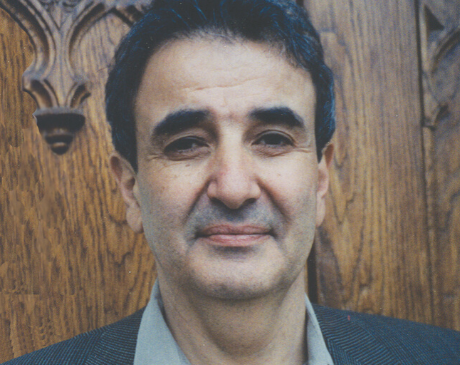Q & A: American Poetry
Q & A American Poetry: Lawrence Joseph

Are there essential ways in which you consider yourself an American poet?
What is American about my poetry is that it's written in the American language. I think Ezra Pound was correct when he said that English, for an American, is a foreign language.
When you consider your own "tradition," do you think primarily of American poets?
I consider myself in the tradition of American poets who have written not only out of the American tradition, but out of traditions other than our own.
Do you believe there is anything specifically American about past and contemporary American poetry? Is there American poetry in the sense that there is said to be American painting or American film? Do you wish to distinguish American poetry from British or other English language poetry?
What is American about American poetry is the American language, whatever it may be, as experienced in the poem.
Which historic poets do you consider most responsible for generating distinctly American poetics?
Every poet, in every poem, in any language, at any time, generates a poetics. Today, April 22, 1998, I think of something Louis Zukofsky said, that the "test of poetry is the range of pleasure it affords as sight, sound, and intellection." If we, as poets, identify ourselves as American in any way, what we see, hear, and think in our poems has something—maybe a lot—to do with America.
What import does regional poetry occupy in your sense of American poetry?
Place, in a poem, must be, in some sense, metaphorical.
What significance does popular culture possess in your sense of American poetry?
Any part of a culture can be part of an American poem.
What about the American poets who lived primarily in Europe (Eliot, Pound, Stein)? What about the European poets who have recently lived or worked in America (Heaney, Walcott, Milosz)?
Stein? Here are the final words of her last book, Brewsie and Willie, an epilogue entitled "To Americans":
"G.I.s and G.I.s and G.I.s and they have made me come all over patriotic. I was always patriotic, I was always in my way a Civil War veteran, but in between, there were other things, but now there are no other things. And I am sure that this particular moment in our history is more important than anything since the Civil War. We are there where we have to fight a spiritual pioneer fight or we will go poor as England and other industrial countries have gone poor, and don't think that communism or socialism will save you, you just have to find a new way, you have to find out how you can go ahead without running away with yourselves, you have to learn to produce without exhausting your country's wealth, you have to learn to be individual and not just mass job workers, you have to get courage enough to know what you feel and not just all be yes or no men, but if you really learn to express complication, go easy and if you can't go easy go easy as you can. Remember the Depression, don't be afraid to look it in the face and find out the reason why, looks facts in the face, not just what they all say, the leaders, but every darn one of you so that a government by the people for the people shall not perish from the face of the earth, it won't, somebody else will do it if we lie down on the job, but of all things don't stop, find out the reason why of the Depression, find it out each and every one of you and then look the facts in the face. We are Americans."
Are you interested in poetry written in America but not in English?
If I know the language a poem is written in, then my interest in it, as a poem, is necessarily, limited.
Are you more likely to read a contemporary non-American poet who writes in English or a contemporary non-American poet translated into English?
It depends on the poem.
Do other aspects of your life (for instance, gender, sexual preference, ethnicity) figure more prominently than nationality in your self-identity as a poet?
Every aspect of my life figures in my self-identity as a poet, or, more precisely in the "self-identity" that figures in my poems.
Do you believe you could readily distinguish a poem by an American poet from a poem by other poets writing in English?
I do not see any purpose in distinguishing, by nationality, a poem written in a language that I can read, other than the critical fact that it is written in a language different from my own.
What do you see as the consequences of "political correctness" for American poetry?
Poets' politics, like everyone else's. A poem, if commodified, like all forms of commodified language, include politics at some critical level. Politics are as much a part of a poem as any other part, but not any more so.
What are your predictions for American poetry in the next century?
What would have been the predictions for American poetry at the beginning of the twentieth century?
Published 1999.


